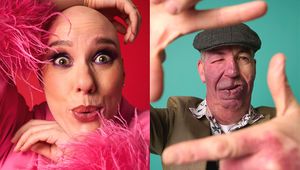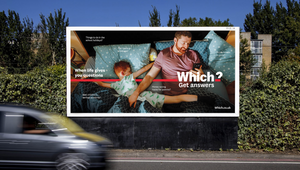
Planning for the Best: Justin Cox on the Frustration of a Fixed Mindset

Justin has 20 years of experience working in the advertising industry. He joined MSQ earlier this year, becoming the group’s first chief strategy officer for North America and forming a new MSQ North America leadership team.
Previously, GM and chief strategy officer at Heat+Deloitte, Justin has also held strategy and leadership roles at DDB, Pereira & O'Dell, Razorfish, Hal Riney, working on iconic global brands such as Intel, Levi’s, Walmart, Sony, Electronic Arts, Microsoft and Mountain Dew.
LBB> What do you think is the difference between a strategist and a planner? Is there one?
Justin> I’ve been called both over the course of my career, and while the names differed, the work never did. I’m sure we could argue over the nuances, but there are much bigger debates to be had…like, why does anyone still wear turtlenecks?
Name calling aside, there is a noticeable difference in the role strategy plays today versus 10 years ago. In my experience, strategy was used to synthesize a company’s business or marketing strategy into something creative teams could use to create ads. Then on the other end, strategy was responsible for creating frameworks that helped all the individual ads fit together cohesively. This helped creatives organize their work and made it more buyable to clients.
This doesn’t happen today. Too much content. Too much programmatic media. Too many messages. Most clients are bringing us in way further upstream. Strategy is talking about go-to-market plans, customer acquisition strategy, A/B testing, customer journeys, and yes brand positioning and content or campaign strategy. Regardless, no one questions your title. Your clients and your co-workers want you in the room to make sense of the complexity, identify where growth is going to come from, solve problems and ultimately inspire everyone around you.
LBB> And which description do you think suits the way you work best?
Justin> The description that all planners should strive for, and that I hope describes me, is driven, inspirational, and useful.
Driven—you need to have a fire under your ass to succeed in this business. The worst perception in our business is that of lazy strategist or planner. Bringing your energy and your full self to your projects is critical to delivering good strategy. And it’s contagious.
Inspirational—develop the ability to see the big picture or imagine it if it doesn’t exist. Marketing is so complex and there are so many aspects to consider, that everyone needs to be reminded of the end goal now and again. If you can rally people around the big picture, you’ll keep people motivated and sane…even if for an extra day or two.
Useful—do not get caught up in the science of “planning.” Being precious about strategy itself is the surest path to being hated by creatives and ignored by clients. Strategy matters, yes. But it’s also a means to end. Get into the details, understand the boring stuff, solve the problems everyone is putting off. Do the things that have nothing to do with advertising but are still strategic. Strategy’s role is to find the way and smooth the road for everyone else.
LBB> We’re used to hearing about the best creative advertising campaigns, but what’s your favourite historic campaign from a strategic perspective? One that you feel demonstrates great strategy?
Justin> I’ve been fortunate to be a part of some of the most successful campaigns in the last decade or so—Intel & Toshiba’s “The Beauty Inside, “Skype’s “Stay Together” and Madden NFL’s “Madden Season.” All were wildly creative and had a strong strategic insight at their core. But even the best campaigns are temporary. You can win 16 Cannes Lions one year and be a distant memory the next.
The things that stick with me are more marketing ideas than individual campaigns. I love what Spotify has done with users’ listening activity. It’s manifested itself in different campaigns over the years – “2018 Goals,” “Year Wrapped,” “Music for Every Mood” – but it’s just a brilliant marketing strategy. From an emotional perspective, it feeds on our need to have something personal and that desire to know what other people like. It makes us feel like unique individuals and like we’re a part of something universal as well. Secondly, the use of data and analytics makes the effort timelier and more culturally relevant than ever. As long as people use the platform, the fact that 1,235 people liked the “I Love Gingers” playlist, will always be relevant. Lastly, the strategy features specific songs, playlists and genres which encourages discovery on Spotify and that in turn drives revenue to the artists.
It’s good for the company, the users, and the artists. It’s a perfect marketing strategy. I hope they keep finding innovative ways to bring it to life.
LBB> When you’re turning a business brief into something that can inform an inspiring creative campaign, what do you find the most useful resource to draw on?
Justin> It’s more of starting point than a resource. I spend as much time as possible thinking about what we are trying to achieve. And I’m not talking about “increasing sales” or “shifting perception.” I dig deep to identify the underlying problem or desired end state that drives everything. Having a clear starting point makes it easy to distinguish what goes into the strategy and what is left out. Importantly, I don’t think of things that will inspire campaigns. I try to think of things that will inspire the people I work with, creatives and clients alike.
LBB> What part of your job/the strategic process do you enjoy the most?
Justin> When you’ve got something that is technically right, but not interesting. You sit with it. Maybe you’re debating it with a few other people. As you dismantle it and explore all the related and unrelated paths, a better idea emerges. And then everything starts to fall in place, and you can feel the energy in the room (or over Zoom) change. It’s like winning in the final seconds after being down the entire game. I love that feeling.
LBB> What strategic maxims, frameworks or principles do you find yourself going back to over and over again? Why are they so useful?
Justin> The 3C’s. Company, Consumer, Competition. Find a singular insight for each and a strategy will emerge. I love the constraints. No tangents or extra thoughts. You can use it to come up with brand strategy, campaign platforms, product ideas, anything. It’s so simple it almost feels wrong. But it works. Every. Single. Time.
LBB> What sort of creatives do you like to work with? As a strategist, what do you want them to do with the information you give them?
Justin> I love working with creatives who take the information and insights and totally reinterpret it. I’ve always viewed strategy as a point of inspiration. I’m disappointed when creative work is a literal interpretation of the strategy. That usually means the strategy wasn’t good enough to begin with. I think of it like cooking. If strategy provides the right ingredients and just enough direction, creatives will make an amazing meal.
LBB> There’s a negative stereotype about strategy being used to validate creative ideas, rather than as a resource to inform them and make sure they’re effective. How do you make sure the agency gets this the right way round?
Justin> I’m not too concerned about this – if the creative product is good and solves the brand’s objective. Problems arise when strategy does not provide clarity at the beginning, then the agency aimlessly wanders the creative dessert, resulting in ideas that do not feel anchored to anything. You only need to two things to get it right – absolute clarity on the problem you’re trying to solve and a strong insight. Other stuff is helpful, but the best marketing in the world is clear about what it’s trying to do and contains an insight that punches you in the gut.
LBB> What have you found to be the most important consideration in recruiting and nurturing strategic talent? And how has Covid changed the way you think about this?
Justin> Do not hire yourself. The agency already has a ‘you.’ Recruit people with different backgrounds and strengths. Look for people who have a lot going on outside of work. That’s the only way you get new thinking. Finally, hire for ability not necessarily previous experience. The best people don’t always have the longest resumes or the most Cannes Lions.
When it comes to nurturing talent, focus on growing people’s confidence. Teaching the craft is important. But it’s more important to help people find their voice. It is remarkable how much better people are when they are self-assured, and they know they have your support. This has the added benefit of creating different points-of-view and styles that the agency can put in front of clients.
LBB> In recent years it seems like effectiveness awards have grown in prestige and agencies have paid more attention to them. How do you think this has impacted on how strategists work and the way they are perceived?
Justin> I haven’t seen this change how people work. Awards are nice but chasing them is a losing game. Today’s successful strategists are aligning themselves with the things that keep CMOs up at night—growth, being disrupted by a new player in the category, losing customers, adapting to a more on-demand consumer culture. Strategists should be lending their talents to these problems. All the better if you win awards for it.
LBB> Do you have any frustrations with planning/strategy as a discipline?
Justin> Not with the discipline itself. Frustration arises when people are unwilling to change a strategy that isn’t working. You see this mindset that believes the strategy is somehow off-limits, but everything around it needs to change. That fixed mindset—whether it’s strategy, creative or any other discipline—is the most frustrating.
LBB> What advice would you give to anyone considering a career as a strategist/planner?
Justin> Don’t worry about where you start. Just pick something. Become a specialist in some aspect of strategy—content, media, UX, data, research, etc. Then work your ass off for the first 10 years of your career. That may not sound fun, but the momentum and knowledge you build in the first decade of your career is the difference between getting lost in the strategy universe and finding your place in it. And don’t be shy about asking people you’ve never met to be your mentor. Expand your network early and often.









